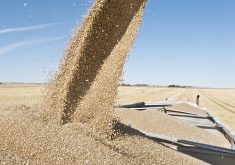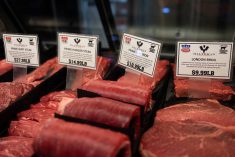Agriculture Canada thinks prairie farmers will seed fewer acres to special crops in 1998-99, since big crops this past year are leading to weaker prices.
In an outlook released Dec. 23, Agriculture Canada’s market analysis division said although yields for many special crops were disappointing last summer, increased acreage meant that overall production increased.
Demand did not increase in step, so carryover stocks into the 1998-99 crop year should build.
Other crops, especially oilseeds, are expected to have higher relative prices and so special crop acres will shift to alternatives such as canola and flax, the report said.
Read Also

India slaps 30 per cent import duty on yellow peas
India has imposed a 30 per cent duty on yellow pea imports with a bill of lading date on or after Nov. 1, 2025.
Dry peas saw record production in 1997-98 of 1.75 million tonnes.
Domestic consumption this year is expected to increase due to demand from the growing hog industry looking for an alternative to imported soybeans. Exports are also expected to be up.
But that won’t be enough to avoid an increase in the carryover to 450,000 tonnes, up from 132,000 tonnes in 1996-97.
The division expects Canadian pea prices to average $165-$195 a tonne in 1997-98.
“In 1998-99, area seeded to peas is expected to decrease by 20 percent due to higher relative prices for alternative crops and rotational considerations,” the report said.
Assuming average yields, production is forecast at 1.3 million tonnes. That, coupled with the high carry-in stocks, means supply will again outstrip demand and prices are expected to fall to $150-$190 tonne.
Low yields for lentils last summer offset higher acreage, leading to a decline in production of five percent to 379,000 tonnes. With carry-in stocks of 77,000 tonnes, total supply is large and despite an expected rise in exports, the amount left at the close of the crop year is still expected to be a burdensome 70,000 tonnes. Ag Canada expects prices this year to average $300 a tonne.
Given this year’s low prices, the government analysts expect farmers to seed fewer lentil acres in 1998-99. Even with normal yields, production is expected to decrease 10 percent to 338,000 tonnes. Exports and domestic use are expected to make a dent in supplies. Stocks at the end of 1998-99 are expected to be down to 50,000 tonnes, the lowest since 1993. With supplies finally under control, prices should climb to $315-$355 a tonne.
Mustard similar
The mustard outlook for 1998-99 is for production and prices to remain similar to this year.
Average prices for 1997-98 are expected to be $365-$395 due mainly to contracts signed in early 1997 when prices were high. Prices have since fallen off and seeded area is expected to decline slightly, but with average yields, production should be steady.
After record production and carryover in 1996-97, canaryseed prices fell and area plunged 55 percent in 1997-98 to 279,000 acres.
Good exports this year will help drop the expected carryover down to 98,000 from 150,000 tonnes in 1996-97.
However, prices are not expected to recover and should average $315-$345 a tonne this year.
In 1998-99, acres are expected to increase slightly and production might climb to 140,000 tonnes.
“Demand is expected to remain stable and carry-out stocks (at July 31, 1999) are expected to decline further,” the report said.














